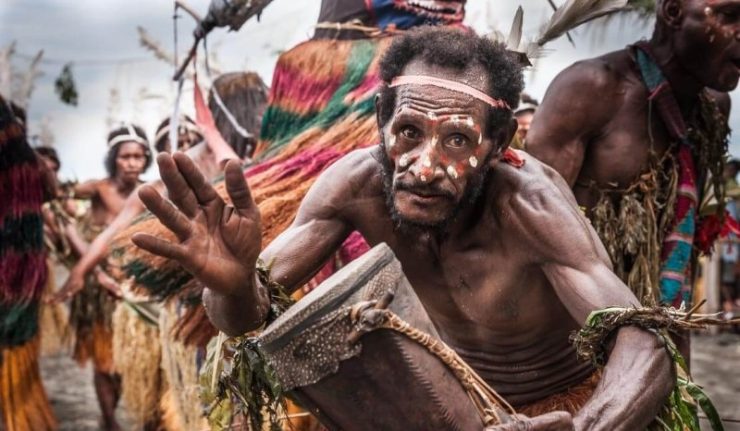PAPUA province is not only rich in natural resources, it is also home to countless diverse and unique cultures. Among Papua’s signature cultural symbols is a traditional music instrument called Tifa, whose name has become synonymous with the province.
Papua, which has seen much infrastructure development over the years, has already embraced modernization in several aspects of life. Yet, the legacy of the Tifa has remained protected to this day.
In the simplest terms, Tifa is a percussion instrument. Though it produces music when struck, like several traditional Indonesian instruments, what makes Tifa stand out is its close association with folklore and verbal traditions.
Different tribes have passed on their own myths and stories on the origins of the Tifa. According to one version prevalent in Biak, the instrument was first wrought by an orphaned boy from the village. As the story goes, the boy had been invited to a party, which every villager had been asked to attend.
As was custom then, all the villagers attending the party had to bring something from home. This saddened the boy, who did not have anything to bring. It was while he was walking in the forest thinking about this that he chanced upon a lizard, who was striking his stomach and producing a sound very similar to a percussion instrument. When the lizard asked him why he looked unhappy, the boy told him of his predicament.
The lizard told the boy to take its skin, burn it on a staff, then cut it in a circular pattern, and mount it on a piece of wood. He told the boy the instrument thus fashioned would produce a unique and distinctive sound when struck repeatedly.
The boy followed his advice and played the instrument at the party. When one of the Tribal Chiefs asked him what he was playing, the boy said it was a ‘sreb’. From that day on, the people of Biak call the Tifa a sreb. The story illustrates how the Tifa is deeply-entrenched in the history of the Papuan people.
In the modern era, the story may sound too much like a myth, but it’s the very belief and appreciation of the story that has prompted Papuans to preserve the Tifa for a very long time now.
According to the head of the Tourism Department of Jayapura, Chris K. Tokoro, said the Tifa is not an instrument that can be played by just anyone. It serves a specific purpose. The Tifa is commonly played during traditional rituals, welcoming guests, and even as a war cry, he explained.
Traditionally, the Tifa has mainly been played by men, in keeping with traditional teachings about gender roles in Papua, which require men to lead women in all aspects of life. Compliance with gender roles is seen as a way to respect and honor ancestral values by Papuans.
But, in certain regions, such as Raja Ampat Islands, many women have been seen playing the Tifa. In Papua, another notable occasion when the Tifa is played is Sing-sing, when various tribes gather to showcase their respective cultures. These gatherings are held in order to exchange knowledge of their traditions so they can learn from one another. This demonstrates the Tifa’s power to bring Papuans together.

What further differentiates Tifa from percussion instruments found in other areas is the patterns it has on the sides. These patterns or symbols have specific ethnic and spiritual meanings and represent stories about natural life in Papua, and also the gratitude the Tifa makers feel about the blessings they have received in life.
The Tifa is very commonly used by various tribes in Papua — Mali Anim, Biak, Sentani, Teminabuan, and many more. Each tribe has its own kind and name of Tifa. The Tifa is called ‘eme’ by the Asmat people, ‘Kalin Kla’ in Teminabuan, ‘Wachu’ in Sentani, ‘Sirep’ or “Sandio” in Biak, and ‘Kandara’ by the Mali Anim people.
The people of Papua are not only preserving the Tifa as a symbol of their culture, but also developing a way to make it a financially beneficial item to sell. The Tifa is thus playing an important role in the economy of Papua. Many Papuans produce Tifa in large numbers for sale. The instrument is sold at different price ranges, depending on the complexity of the patterns, the materials used, and duration of the sound produced.
This economic value is also expected to guarantee the longevity of the Tifa in Papua. Therefore, Papuan elders are asking the youth to stay true to their culture in an effort to protect the legacy of the Tifa and pass it on for generations to come.
The provincial government of Papua has passed regulations, which clearly state that all intellectual property rights owned by the indigenous people of Papua are protected by law. The regulations are expected to serve as a solid legal foundation for preserving the Tifa for the foreseeable future. [antaranews/photo special]
















